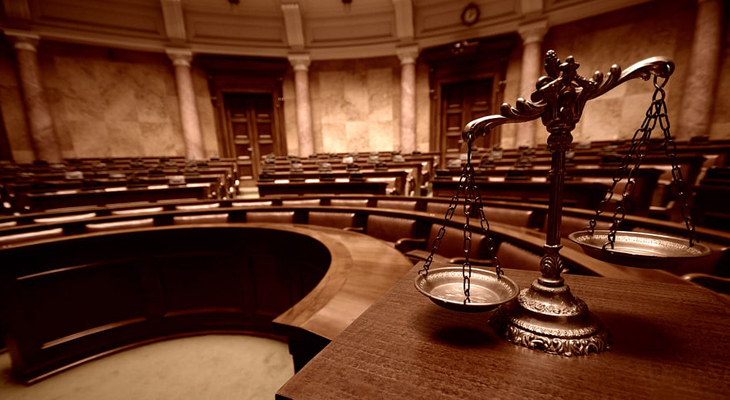
Criminal trials in Canada are carried out in either higher-level court, also known as the Queen’s Bench or Supreme court, or in the lower provincial court. Usually, the increasingly severe criminal trials are held in Supreme courts before a judge and jury or a judge only. On the other hand, the less severe criminal trials are typically held in the provincial courts before a judge only.If your criminal trial is being held in Queen’s Bench, you’ll likely have a preliminary hearing before the start of your trial to determine whether or not there’s enough evidence against you in order to carry out a formal trial. During the trial, the Crown Prosecutor needs to prove beyond a reasonable suspicion that you’re guilty of the alleged crime; otherwise, you’ll be acquitted of the criminal charge.
Court Proceedings At The Start Of The Criminal Trial
In the beginning, charges are read out loud to the court. This action in law is known as an arraignment. After reading the charges, you’ll be asked to enter a plea, which means to declare whether or not you’re
guilty of the alleged offence. If you choose to plead not guilty, this doesn’t mean that you do not deny that you committed the crime.When you plead not guilty, the Crown will have to prove beyond a reasonable suspicion that you’re guilty of the offence. If you plan to plead guilty, it’s best to seek expert legal advice beforehand in order to understand the probable consequences. In some cases, it’s also possible to plead guilty to a lesser offence.
Crown Prosecutor’s Role
During trial, the Crown Prosecutor and your criminal defence lawyer will both have opportunities to present their cases. To prove that you committed the crime, the Crown Prosecutor has to present a credible piece of evidence in front of the court. The evidence can be in physical form such as a gun or weapon with your fingerprints on it.The Crown Prosecutor’s evidence can also include a testimony from a witness testifying that they saw you leaving the crime scene. It’s up to the Crown whether they rely on direct evidence or circumstantial evidence. At first, the Crown Prosecutor will present their case and witnesses.After they’re finished asking questions from all witnesses, your defence lawyer will be asked to cross-examine the witnesses. This provides your lawyer with an excellent opportunity to find any flaws in witness statements. The prosecution can also re-examine a witness to clarify emerging issues during cross-examination.
Dismissal Of Charges
If the Crown Prosecutor fails to present enough evidence to prove your guilt, your defence attorney can ask the judge to dismiss the criminal charges against you. In case of successful dismissal of your criminal charges, your legal team won’t need to present any evidence in your defence, and you’ll be acquitted of all charges.
Criminal Defence Lawyer’s Role
If the Crown Prosecutor can present enough evidence to prove your guilt, your defence attorney will need to introduce another evidence to defend your case. If the Crown’s evidence is weak, then there’s usually no need to present additional evidence.The Crown Prosecutor can cross-examine any witness your defence lawyer calls in the court, in an attempt to find flaws in their statement. As an accused, you don’t need to testify at your trial; but if you choose to do so, you can also be cross-examined by the prosecutor for which your legal team should be well prepared.
Making Sentencing Submissions
When each side of the case has presented its evidence and witnesses have testified, both of them will be allowed to make submissions to the judge. A submission is a summary of the case from each side which may include arguments regarding law and its interpretation.The judge and jury will then decide whether or not you’re guilty of the alleged crime. In case the court declares you guilty, you’ll be sentenced or penalized immediately, or at a later date as per your criminal case. If you’re on bail, your bail may be cancelled after you’ve been found guilty, even before your sentence begins.
Slaferek Callihoo is a highly skilled criminal defence law firm based in Edmonton, Alberta. Visit our website to learn more about our expert legal services or
contact us for expert legal consultation.
 Criminal trials in Canada are carried out in either higher-level court, also known as the Queen’s Bench or Supreme court, or in the lower provincial court. Usually, the increasingly severe criminal trials are held in Supreme courts before a judge and jury or a judge only. On the other hand, the less severe criminal trials are typically held in the provincial courts before a judge only.If your criminal trial is being held in Queen’s Bench, you’ll likely have a preliminary hearing before the start of your trial to determine whether or not there’s enough evidence against you in order to carry out a formal trial. During the trial, the Crown Prosecutor needs to prove beyond a reasonable suspicion that you’re guilty of the alleged crime; otherwise, you’ll be acquitted of the criminal charge.
Criminal trials in Canada are carried out in either higher-level court, also known as the Queen’s Bench or Supreme court, or in the lower provincial court. Usually, the increasingly severe criminal trials are held in Supreme courts before a judge and jury or a judge only. On the other hand, the less severe criminal trials are typically held in the provincial courts before a judge only.If your criminal trial is being held in Queen’s Bench, you’ll likely have a preliminary hearing before the start of your trial to determine whether or not there’s enough evidence against you in order to carry out a formal trial. During the trial, the Crown Prosecutor needs to prove beyond a reasonable suspicion that you’re guilty of the alleged crime; otherwise, you’ll be acquitted of the criminal charge.